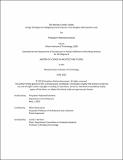The Monkey Cheeks Toolkit: Design Strategies for Mitigating Flood Impacts in the Bangkok Metropolitan Area
Author(s)
Rattanathumawat, Pimpakarn
DownloadThesis PDF (129.4Mb)
Advisor
Mazereeuw, Miho
Terms of use
Metadata
Show full item recordAbstract
Bangkok, the capital of Thailand, has been facing frequent and destructive floods due to the recent decades of urban expansion and inadequate public drainage infrastructure. Although the Bangkok Metropolitan Administration (BMA) has actively improved the flood drainage network as the city expanded, its developed capacity and configuration have not kept pace with its population growth and rapid urbanization. Additionally, due to the escalating impact of climate change, Bangkok is expected to face more severe flooding, as well as the potential for greater water supply challenges, over the course of this century.
Rather than solely depending on flood protection via large-scale infrastructure, this thesis proposes a decentralized approach to stormwater management, in which rain is captured where it falls through a local flood control measure called “Monkey Cheeks.” Although this measure concept is commonly utilized in large water retention areas, the thesis applies this retention system to an ultra-urban environment such as the Bangkok Metropolitan Area, where the availability of land is limited. The main objective is to embrace water as a valuable resource and seize the opportunity to incorporate it into the fabric of the city. The outcome of this research is presented in the form of a Design Toolkit, a set of strategies for implementing Monkey Cheeks across various scales of urban conditions, ranging from small individual property-level to large-scale publicly owned spaces. The Toolkit concludes with case studies illustrating how these strategies can be applied to existing conditions of Bangkok’s urban fabric, and how they can be combined to alleviate flooding throughout the city at large. Together, a network of Monkey Cheeks within the city can play a critical role in mitigating flood risk by slowing down runoff that could otherwise overwhelm public sewage systems, storing rainwater to tackle water supply challenges, and restoring the hydrologic function of the urban landscape by releasing water back to the aquifer. As such, the research contributes to the advancement of sustainable urban water management practices and highlights the importance of integrating traditional knowledge with modern urban areas.
Date issued
2023-06Department
Massachusetts Institute of Technology. Department of ArchitecturePublisher
Massachusetts Institute of Technology